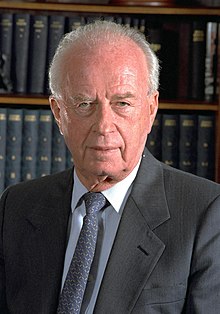Yitzak Rabin
| Yitzhak Rabin | |
|---|---|
 |
|
| 6th and 11th Prime Minister of Israel | |
|
In office 13 July 1992 – 4 November 1995 |
|
| President | |
| Preceded by | Yitzhak Shamir |
| Succeeded by | Shimon Peres |
|
In office 3 June 1974 – 22 April 1977 |
|
| President | Ephraim Katzir |
| Preceded by | Golda Meir |
| Succeeded by | Shimon Peres (acting) |
| 10th Minister of Defense | |
|
In office 13 July 1992 – 4 November 1995 |
|
| Prime Minister | Himself |
| Preceded by | Moshe Arens |
| Succeeded by | Shimon Peres |
|
In office 13 September 1984 – 15 March 1990 |
|
| Prime Minister | |
| Preceded by | Moshe Arens |
| Succeeded by | Moshe Arens |
| Personal details | |
| Born |
1 March 1922 Jerusalem, Mandatory Palestine |
| Died | 4 November 1995 (aged 73) Tel Aviv, Israel |
| Nationality | Israeli |
| Political party | Alignment, Labor Party |
| Spouse(s) | Leah Rabin |
| Children |
|
| Profession | Military officer |
| Signature |  |
| Military service | |
| Allegiance |
|
| Service/branch |
Haganah Israeli Defense Forces |
| Years of service | 1941–1967 |
| Rank |
|
| Battles/wars |
Syria–Lebanon Campaign 1948 Arab–Israeli War Six-Day War |
Yitzhak Rabin (Hebrew: יצחק רבין; IPA: [jitsˈχak ʁaˈbin]; 1 March 1922 – 4 November 1995) was an Israeli politician, statesman and general. He was the fifth Prime Minister of Israel, serving two terms in office, 1974–77 and 1992 until his assassination in 1995.
Rabin was born in Jerusalem to Ukrainian-Jewish immigrants and was raised in a Labor Zionist household. He learned agriculture in school and excelled as a student. He led a 27-year career as a soldier. As a teenager he joined the Palmach, the commando force of the Yishuv. He eventually rose through its ranks to become its chief of operations during Israel's War of Independence. He joined the newly formed Israel Defense Forces in late 1948 and continued to rise as a promising officer. He helped shape the training doctrine of the IDF in the early 1950s, and led the IDF's Operations Directorate from 1959 to 1963. He was appointed Chief of the General Staff in 1964 and oversaw Israel's victory in the 1967 Six-Day War.
Rabin served as Israel's ambassador to the United States from 1968 to 1973, during a period of deepening U.S.–Israel ties. He was appointed Prime Minister of Israel in 1974, after the resignation of Golda Meir. In his first term, Rabin signed the Sinai Interim Agreement and ordered the Entebbe raid. He resigned in 1977 in the wake of a financial scandal. Rabin was Israel's minister of defense for much of the 1980s, including during the outbreak of the First Intifada.
...
Wikipedia
